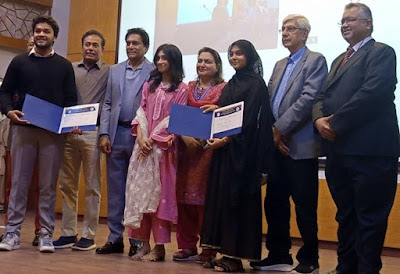Genetic disorders in Pakistan: Experts stress need for awareness, tackling know-how
IV Report
KARACHI: Experts discussing genetic disorders
in humans at an international meeting, organised at Dow University of Health
Sciences (DUHS), Karachi, highlighted the importance of increased awareness and
tackling know-how in Pakistan, particularly in view of the high rate of
consanguineous marriages, also known as cousin marriages, which increases the
risk of genetic diseases.
The senior physicians noted the dearth of
genetic specialists, emphasising the need for extensive inclusion of genetic
clinics, genetic counseling, and genetic testing in the local healthcare system
and medical education degree programmes.
The DUHS meeting, titled 'Genetics today and
tomorrow', was held in collaboration with the Association of Physicians of
Pakistani Descent of North America (Appna) and featured faculty from genetics
and pathology from Pakistan and the US.
Genetic disorders
DUHS Vice Chancellor Prof Dr M Saeed Quraishy
stressed the need for understanding the consequences of cousin marriages by all
segments of society, including the media. "The gravity of this extremely
important issue for future generations is not understood well in our
society."
A genetic counselor from Texas, D Myla Ashfaq,
talked about medical genetics, screening, diagnosis of genetic disorders, and
genetic counseling. She explained that a genetic counselor works on assessing
genetic concerns, providing information about genetic conditions, determining
family history, discussing genetic testing, and offering psychosocial support.
Dr Ashfaq discussed a case of a family from Karachi living in Texas, whose son faced microcephaly (a condition where the head size is smaller compared to the body) and other disorders due to consanguineous marriage. She also referred to another case where, through counseling, the partners were advised to undergo genetic testing before marriage, leading them to reconsider their decision to protect future generations from genetic disorders.
Genetic
clinics
She emphasised that experts' role is to create
awareness and understanding because the rate of cousin marriages in Pakistan is
about 70%. "Cousin marriage is considered a better option due to social
benefits, including strengthening family ties."
Dr Ashfaq further mentioned that the most
common single-gene disorder in Pakistan is thalassemia. "Each year, there
are more than 4,000 new affected births, and every 1-4 per 1000 infants have
thalassemia."
She highlighted the benefits of genetic
diagnosis at embryo, fetus, infant, child, and adult stages. She pointed out
that genetic disorders are prevalent in Pakistan, and their diagnosis is
crucial, requiring awareness and education to enable informed decision-making,
emphasising that genetic clinics, genetic counseling, and genetic testing need
to become integral parts of the healthcare system in Pakistan.
Way
forward
US-based Professor Dr Rizwan Naeem discussed
reducing the burden of autosomal recessive disorders in Pakistan and the role
of genomics and personalised medicine. He also mentioned the shortage of
genetic specialists in Pakistan, suggesting incorporation of the genetic
subject into the MBBS curriculum as well.
A DUHS faculty member, Dr Misbah Hanif, told the participants that genetic clinic facilities are being provided at Dow University, and Dow University has also started teaching the subject of Clinical Genetics to MBBS students.
Appna President Dr Asif Mohiuddin outlined the
vision behind the establishment of his association and the guidance provided to
medical students seeking higher education in the USA and other countries.
The meeting was attended by DUHS Registrar Dr
Ashar Afaq, Dow Medical College Principal Professor Saba Sohail, Appna
Chairperson of Winter Meeting Dr Saeed Sabir, Appna Focal Person from Dow
University Professor Dr Naseem Ahmed, and Chairperson of Appna Young Physicians
Committee Dr Muhammad Siddique Khurram, among others.







Comments
Post a Comment